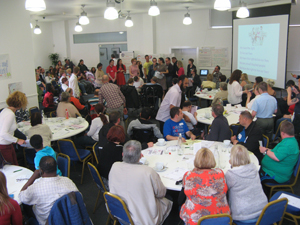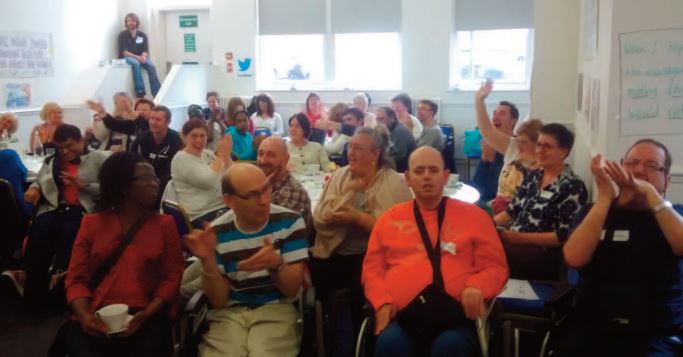
We have posted a number of times on the site to focus on key reports about responses to the appalling events at Winterbourne View, including the Government’s response, the lack of progress shown in the stocktake, as well as good practice examples, and guidance for professionals.
The collective voice of people with learning disabilities
However, earlier this year, people with learning disabilities themselves organised a major national event, held in Leeds which was led by people with learning disabilities for people with learning disabilities.
The event was held to enable people with learning disabilities to come together with the specific aim of adding their collective voices to the campaign for the closure of institutions
The report of the event, “Our Voices, Our Choices, Our Freedom” is now available. The report shares some of the key things said in the keynote sessions of the day, including the opening ‘Speak Out Session’ where people openly shared experiences of living in institutions and care homes in the UK and Europe.
The report carries a series of quotes which stand as powerful reminders of the lack of basic freedoms that is often associated with such situations. They speak to a lack of accessible information, respect for privacy and little evidence of personalised responses.
As the event itself threw up a significant number of questions, the report carries answers from delegates.
Key questions remain

Practical suggestions on how to influence the NHS Mandate came in response to questions from the floor
Key questions from the floor included:
- “Why does it (Winterbourne View type scandal) keep happening again and again?
- “We spend lots of money on hospitals and institutions – but in the community, we don’t get the support we need – how do we get government to make sure people with learning disabilities get the money and support we need?”
- “The 1st June deadline for people with learning disabilities to leave treatment and assessment units has failed. Is there a new deadline date for when this will happen?”
- “We want more learning disabilities nurses in hospitals GPs surgeries and elsewhere – are you going to increase the numbers?”
One of the practical things that emerged from the answers to these questions was to suggest that the NHS Mandate the document in which Government’s requirements of the NHS is set out, needed to contain more about support for people with learning disabilities and the participants were urged to be clear in telling Government what needs to be in the Mandate for health services and in particular to work with local clinical commissioning groups to hear the collective voice of people with learning disabilities regarding the closure of institutions and moving resources and support into community settings. Dominic Slowie said that he would support these things.
In relation to the numbers of learning disabilities nurses, Dominic Slowie also said that the Chief Inspector of Hospitals and Chief Inspector of GPs had agreed to ask specific questions in inspections about:
- Where are the Learning Disability Liaison Nurses?
- Are they producing high quality accessible information?
which he hoped would be part of the process of improving these services.
Hopefully, the process of inspection will help them to make their services better.
Using the personal experience of people with learning disabilities
One of the other key messages that emerges from the report is that there is a tremendous amount of personal experience among the group of people with learning disabilities about what it is like to leave long stay institutions – and they are not only willing, but very keen to share that experience.
A number of places have begun to put in place opportunities for peer advocacy, where people with a learning disability support someone going through the change process to better understand what is happening to to build confidence to have their say.
In Sunderland for example, people with learning disabilities wrote a letter to everyone in hospital, “When you come out of hospital, we are here, we have links, we can help you rebuild your lives.” And Gavin Harding, expert by experience is putting together easy read guidance on leaving hospital with ten top tips on how to do well when leaving hospital.
Proposals
A number of workshops looked at various issues and at the end of the day delegates produced four well supported proposals:
- Institutions should not be allowed to be built in the first place – resources should be used in building the support people with learning disabilities need to live successfully in the community.
- People with learning disabilities want to play an active part in making this happen, as employees in care, employment and advocacy services. Our voices and choices can shape a more successful way of doing things.
- To successfully move from institutions to living in the community we need the opportunity to build our self-confidence individually and collectively through:
- Self-advocacy
- Peer-to-Peer support
- Role models – including parents with learning disabilities.
This needs investment and support.
- Living successfully in the community also requires accessibility. This means high quality easy read information, mobility, and access to advocates and self-advocates.
Conclusion and comment
I was very struck in reading this report by the positive and constructive nature of the contributions. Whilst it was clear that the opening speak out session showed such poor practice and lack of respect for human rights, the participants remain upbeat and brimming with potential solutions. It would seem that any work to focus on the remaining high number of people remaining in long stay institutions must make use of this powerful resource.
The representatives from Government and the NHS set out some very clear and practical steps that could be taken and appeared to accept the challenges from the floor.
It is hard to argue with the proposals that emerged from the day and we look forward to the publication of the outcome of the summit referred to in the report.

Proposals from the event will be discussed at a Government summit
Link
Our Voices, Our Choices, Our Freedom, report of a national event, 2014 Change

RT @LearningDisElf: National event for people with learning disabilities provides clear proposals for inclusion and development http://t.co…
National learning disability event http://t.co/nHBL9ka445 http://t.co/neubW9bJdR
National event for people with learning disabilities provides clear proposals for inclusion and… http://t.co/d2SdeftQJA
Today we report on the ‘Our Voices, Our Choices, Our Freedom’ report from @changepeople_ http://t.co/uCCEUrKG8E Pls RT
http://t.co/ziOfGmRzWv via @sharethis
Some really useful ideas in this to act on locally and nationally
Don’t miss: National event for people with learning disabilities provides clear proposals for inclusion & development http://t.co/uCCEUrKG8E
‘Earlier this year, a national event organised by and for people with learning disabilities looked at the closure… http://t.co/IfwOptLT27
I applaud what you are trying to do and commend your efforts so far, sadly however, I fear that you are fighting a losing battle. Winterbourne View is just a significant confirmation of the disastrous consequences of pursuing fundamentally flawed policies for the past quarter of a century. I believe that this has led to the wrong people influencing policy direction – and the wrong people implementing policy.
As far back as 1985 I predicted the possibility of a Winterbourne View outcome and since have pleaded constantly for an informed and objective debate in the public domain – to no avail; I was considered a dinosaur whilst trail blazing ‘second generation pioneers’ set about destroying the infrastructure upon which a sound and achievable care in the community integration policies to meet the needs of people with all levels of disability could be developed.
The charities that should have challenged policy direction failed abysmally, whilst academics, with very few exceptions, complacently let care in the community for the most vulnerable people in the community disintegrate.
Regrettably, those who have manipulated policy and those who implement it will not listen to the voices of people with learning disabilities or their carers. They have not listened as vital day services were relentlessly being closed, they did not listen when the workers at Remploy pleaded with them to keep the factories open, they are not listening now as supportive and happy residential communities are being broken up.
I have written two books on this topic, the first published in 2006 gave a wide overview of day service policy development but predicted the probability of a return to institutions:
LEARNING DISABILITIES The Rise and Potential Demise of Structured Day Services for Adults with Learning Disabilities. 1955 – 2005. (ISBN 9 781899 499 199 )
The second earlier this year:
LEARNING DISABILITIES: Bold Visions: the short cut to inclusion – or the inevitable route to Winterbourne View? (ISBN 978-1-899499-68-7) spells out clearly the efforts I made to bring this grievous issue to the notice of those who were in a position to defend, protect, and influence policies affecting the interests of our most vulnerable fellow citizens.
I will willingly send you e-copies gratis if you would like to look a little closer at the issues I have raised.
Hi Charles,
thanks for your extensive comment on the post. I think the work of Change in this eevnt was really important however in setting out very clearly the collective views of people with learning disabilities.
Interested to hear what other Elf readers think about this
john